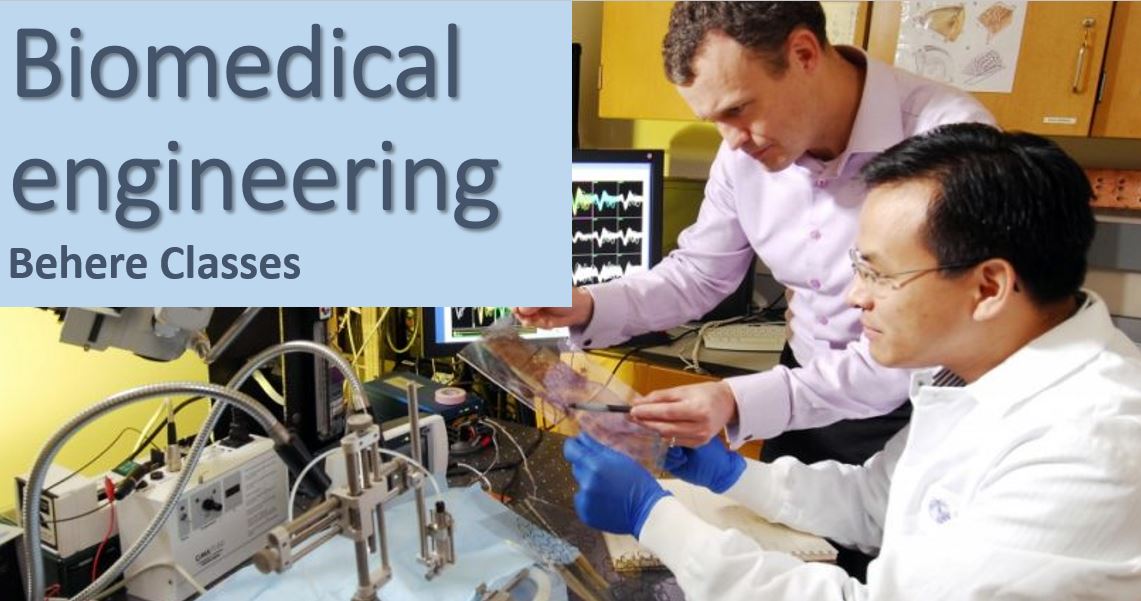Biomedical Engineering
Biomedical engineering applies engineering principles to medicine and biology for healthcare solutions. It involves research, development, and management of medical equipment, spanning diagnostic tools, therapeutic devices, imaging technologies, and pharmaceuticals. As an interdisciplinary field, biomedical engineering plays a vital role in advancing healthcare treatment and improving patient outcomes.
Duration & Course Level:
Biomedical engineering programs range from:
1. Diploma: Typically 3 years after high school.
2. Undergraduate (UG): A 4-year Bachelor's degree.
3. Postgraduate (PG): A 2-year Master's degree.
4. Doctorate (PhD): 3-6 years for advanced research.
Salary Package:
1. Biomedical Engineer: $55, 000 - $85, 000 per year
2. Clinical Engineer: $60, 000 - $90, 000 per year
3. Medical Device Developer: $70, 000 - $110, 000 per year
4. Biomechanical Engineer: $65, 000 - $95, 000 per year
5. Research Scientist: $70, 000 - $100, 000 per year
6. Quality Assurance Engineer: $60, 000 - $90, 000 per year
7. Regulatory Affairs Specialist: $65, 000 - $95, 000 per year
8. Biomaterials Engineer: $65, 000 - $100, 000 per year
9. Healthcare Technology Manager: $80, 000 - $120, 000 per year
10. Rehabilitation Engineer: $60, 000 - $90, 000 per year
These figures may vary based on factors such as location, experience, and the specific industry or organization.
Job Roles:
1. Biomedical Engineer
2. Clinical Engineer
3. Medical Device Developer
4. Biomechanical Engineer
5. Research Scientist
6. Quality Assurance Engineer
7. Regulatory Affairs Specialist
8. Biomaterials Engineer
9. Healthcare Technology Manager
10. Rehabilitation Engineer
Education & Training Requirements:
1. Biomedical Engineer: Bachelor's degree in Biomedical Engineering.
2. Clinical Engineer: Bachelor's degree in Biomedical Engineering, plus certification and clinical experience.
3. Medical Device Developer: Bachelor's or Master's in Biomedical or Mechanical Engineering.
4. Biomechanical Engineer: Bachelor's or Master's in Biomedical or Mechanical Engineering, with a focus on biomechanics.
5. Research Scientist: Master's or Ph.D. in Biomedical Engineering, with research experience.
6. Quality Assurance Engineer: Bachelor's or Master's in Biomedical Engineering, with knowledge of quality systems.
7. Regulatory Affairs Specialist: Bachelor's or Master's in Biomedical Engineering, with expertise in medical device regulations.
8. Biomaterials Engineer: Bachelor's or Master's in Biomedical Engineering or Materials Science.
9. Healthcare Technology Manager: Bachelor's or Master's in Biomedical Engineering or Healthcare Management.
10. Rehabilitation Engineer: Bachelor's or Master's in Biomedical or Rehabilitation Engineering, with experience in assistive technology.
Training may include internships, co-op programs, or specialized courses, with continuing education for career growth.
Innovation & Creativity:
In biomedical engineering, innovation drives transformative advancements in healthcare. Engineers pioneer creative solutions, from biocompatible materials to advanced medical devices, revolutionizing treatments and improving patient outcomes.
Industrial Overview:
Biomedical engineering blends engineering and medical sciences to create solutions for healthcare. From diagnostic tools to prosthetic devices, biomedical engineers innovate to improve patient care. Collaborating with healthcare professionals, they drive advancements that shape the future of medicine.
Industry/Field Future:
The future of biomedical engineering promises revolutionary healthcare advancements through technology integration. Expect precision diagnostics, personalized treatments, and innovative medical devices. Engineers will tackle global health challenges, driving progress in patient outcomes and quality of life.

